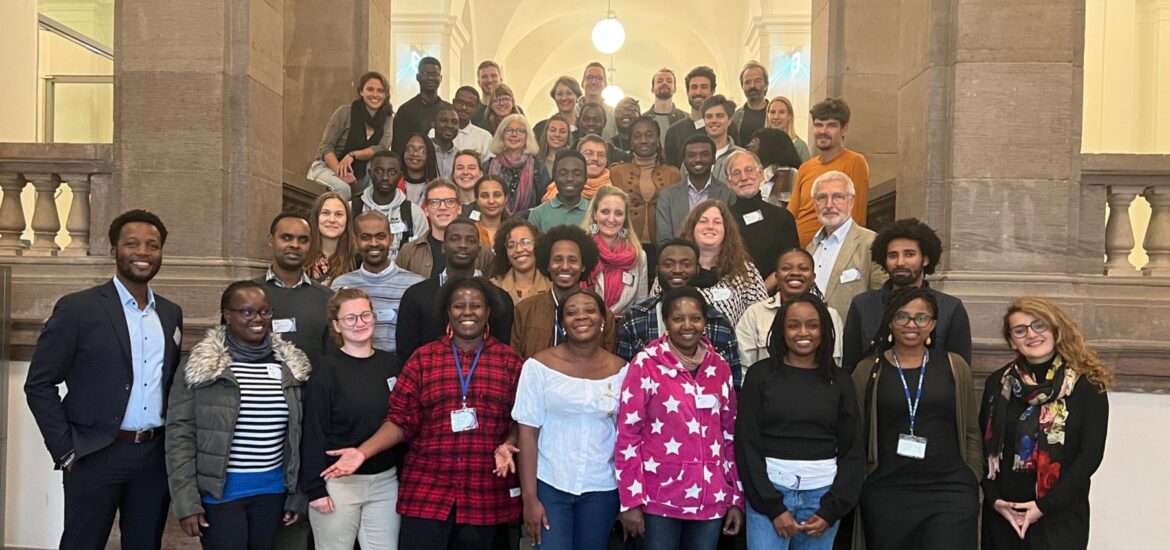When the room is bustling with conversations and Afrobeats, when you’re navigating cooking logistics with an Ethiopian medical doctor, a Bavarian psychologist and a Kenyan engineer (you’ve all only just met moments ago), when you find yourself in interesting interdisciplinary debates about the past, present and future of the African-German dialogue, only to later dance the night away together – then you know what’s up: it’s an ANSA conference!
From the 14th to the 16th of October 2023, this year’s conference took place in the beautiful city of Stuttgart at the Hochschule für Technik (Technology University of Applied Sciences) and featured many presentations and carefully moderated discussions on the broad topic of technological development both inside and outside of Africa. It was kicked off by a guided city tour on Friday afternoon, followed by a fun team cooking evening where everybody got to know each other better over the cutting boards, dishwasher sinks and finally – over dinner talks!
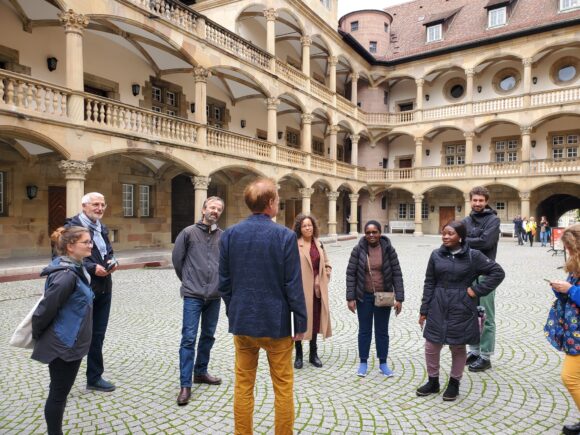
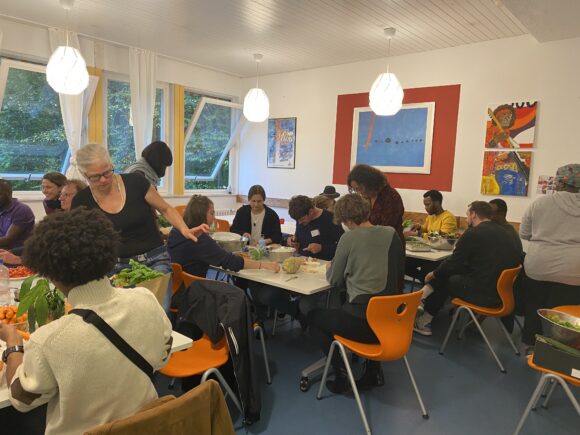
The three keynotes took place on Saturday, featuring experts from widely different fields: Sara Loetz, a doctor, Moses Acquah, a technology business consultant and Marc Hasselbach, a social worker – and as diverse as their disciplinary backgrounds were their visions of a technological future. Between listening and discussing, us ANSAs got together in short coffee breaks in small groups, discussed some more, talked about our own research or experiences of working or studying abroad while nibbling on a croissant.
Sara Loetz introduced us to a topic that felt – in a way – eerily reminiscent of the first outbreak of the Corona pandemic in Italy, 2019: emergency triage. In a lively presentation enriched with her personal experiences of working within the health care system in Malawi, Sara, a paediatrician, took us right into the hospital room: How can those children who need emergency care be identified in the waiting rooms (= categorized as critically ill) before it’s too late? Especially in resource-poor countries like Malawi where patients’ first contact in hospitals is mostly not with medically trained staff, the risk of a child dying before it gets to see a doctor is very high. The concept of ETAT (Emergency Triage, Assessment and Treatment), realized by an app adjusted to the most frequent problems and symptoms of the basic emergency treatment of children, aims to alleviate this problem. The ETAT app, developed by doctors and machine learning experts alike, felt like a hands-on and modern solution (complementing or replacing i.e. informational posters on waiting room walls), but also raised questions: Are apps really the right technological format? What about RSS-feeds? And what about the ethical dilemma that often accompanies triage decision-making – should those decisions really be outsourced to artificial intelligence? Sara’s presentation and the subsequent discussion got us thinking and were certainly an excellent kick-off into the conference!
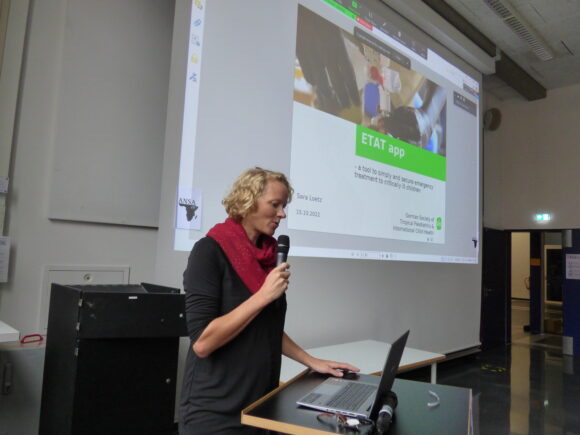
With Moses Acquah, we ventured into more philosophical fields, asking: Is technology making us more human? As a technology business consultant and founder of several tech startups, Moses let us in on the difficulties of making businesses sustainable and – in very general terms – more “human” in the long run. Drawing from years of professional experience in Africa and all over the world, he spoke about how the success of innovative technology such as blockchain depended on the political, economic or social circumstances in different countries (especially in Africa) and encouraged us to reflect on our own behaviour as consumers.
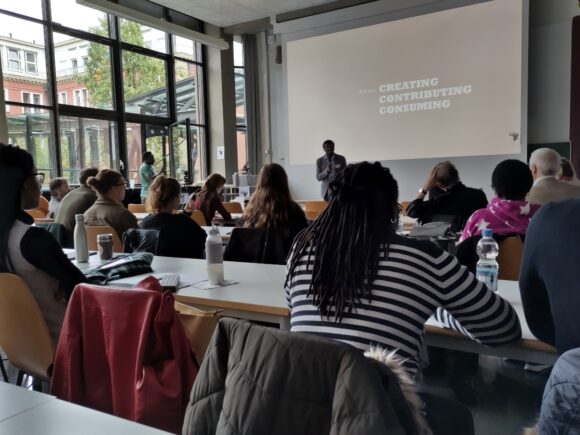
While Sara and Moses were physically present with us in the auditorium, the last keynote speaker and another highly innovative thinker, Marc Hasselbach, was broadcasted to us via video call on the big screen to talk about digital social work, a term that few if any of us had heard before. Even since before the pandemic – when many self-help groups moved to online communication – Marc noticed how access to secure online spaces (i.e. clouds, messenger and video conferencing tools) was missing in Germany, especially in the public health sector. Not only did he introduce us to “Unkonvention”, his online service aiming to close that gap, but discussed with us the general state of digitalisation (or lack thereof) in social work and the public health system in Germany. He furthermore gave us a perturbing yet interesting insight into the darknet as a space for social work (“the darkest of dark places”) – a research project of his.
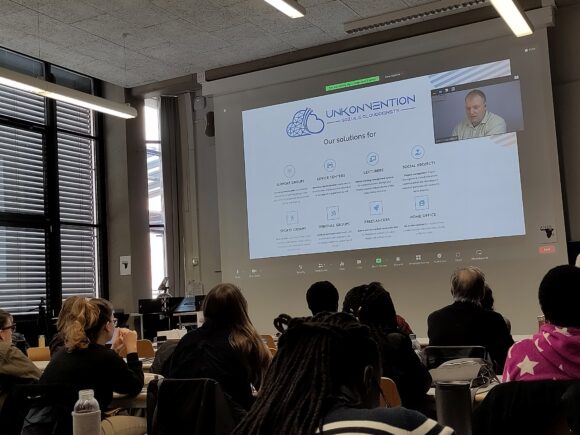
It was, however, the project presentations of ANSAs themselves and the subsequent discussions that once again brought the richness of perspectives cultivated in the Africa Network for Students and Alumni to light. Organized in two time-slots, each presenter gave their highly diverse approaches to the (these days ever more elusive) concept of “technology” to a small group:
We had Christian Seidel introduce us to additive manufacturing technology (3D-printing) and how it might improve everyday life in rural Africa, Luis Ensinger used the problem of water scarcity in the Western Usambara Mountains as a point of departure to discuss with us the issues of the water supply system in Tanzania, the role of private investment and the environmental impacts. Joseph Yankera tackled the topic of energy infrastructure in Ghana and its structural challenges and need for development due to the growing demands of the economy. Ngange Kebbeh looked at Gambia’s public health system through the lense of the very practical needs of hospital administrations, namely: functioning hospital beds (Gesundheitsbetten). Finally, Antonia Kaiser highlighted an entirely new aspect of our technological futures: the uses of text-mining as a way to process large amounts of text as data (i.e. 3000 newspaper articles).
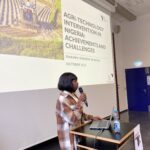
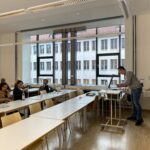
What a day! Exhausted yet inspired from all the interesting input, the day ended with an African dinner, drinks and dancing at “Ebony Restaurant”.
The second – and last – day of this year’s conference concentrated on networking activities, introducing new or prospective members to the ANSA mission, its plans, past events, working groups and gave everybody an idea what they might be able contribute to the network. Be it by planning our next conference, its academic focus or navigating its organizational intricacies, be it by participating in workshops centered around the future of African-German relations, or simply by talking to the network’s experts and passing on their knowledge – there are many ways to get involved in ANSA. It is, after all, what we make of it!
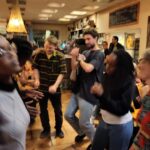
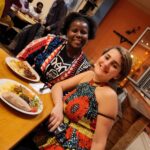
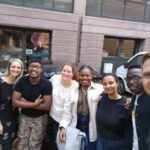
All too soon we all parted ways in the Sunday afternoon light, but not before making plans for regional groups and other new exciting projects first – the infamous ANSA spirit had caught on yet again! Special thanks go to this year’s Vorstand, our amazing conference organization (Orga) group and the numerous helping hands – it’s been a great conference and we are looking forward to the next one!
Lastly, we appreciate our Content Writer: Katharina Hillermann for putting this piece together (ANSA e.V. Mitglied). Thank you:).
